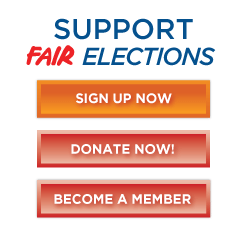With campaign donations up and a lack of federal action, a
joint effort aims to lift the shadows on tax-exempt
political advocacy groups and trade associations.
WASHINGTON - Early last month, state lawyers and election
officials around the country dialed into a conference call
to talk about how to deal with the flood of secret money
that played an unprecedented role in the 2012 election.
The discussion, which included officials from California,
New York, Alaska and Maine, was a first step toward a
collaborative effort to force tax-exempt advocacy
organizations and trade associations out of the
shadows.
The unusual initiative was driven by the lack of progress
at the federal level in pushing those groups to disclose
their contributors if they engage in campaigns, as
candidates and political action committees are required to
do.
"There is no question that one of the reasons to have
states working together is because the federal government,
in numerous arenas, has failed to take action," said Ann
Ravel, chairwoman of California's Fair Political Practices
Commission, who organized the call with officials from
about 10 states.
The 2012 campaign set a high-water mark for independent
groups, which unleashed more than $1 billion into federal
races, three times as much as in 2008, according to the
nonpartisan Center for Responsive Politics.
The bulk of that spending was by "super PACs," which must
disclose their donors. But nonprofit advocacy groups and
trade organizations, which do not have to reveal their
financial backers, accounted for $309 million. Among them
were the conservative Crossroads GPS, the liberal Patriot
Majority USA and the U.S. Chamber of Commerce. The actual
influence of such organizations was far greater, as
tax-exempt groups also poured tens of millions of dollars
into election-related activity that they were not required
to report.
Advocates for disclosure say it is essential for the public
to know who is trying to influence elections. But opponents
say making donors public would infringe on their privacy
and could intimidate some from participating in
politics.
For now, state officials who participated in the conference
call are sharing information on their campaign finance
regulations and experiences with advocacy groups in their
states. But the agencies may move to team up on
investigations and work together to pressure federal
agencies to do more.
The push by state regulators comes as scrutiny of nonprofit
groups is gaining new attention at the federal level. On
Capitol Hill, Sen. Carl Levin (D-Mich.) plans to use his
influential post as head of the Permanent Subcommittee on
Investigations to press for greater oversight of these
groups. And the Securities and Exchange Commission is
considering a rule to require publicly traded corporations
to reveal their political donations.
But disclosure advocates acknowledge they face a steep
climb in Washington.
"I have no reason to believe this is going to be easy,"
said Sen. Lisa Murkowski (R-Alaska), who unveiled a
bipartisan disclosure bill with Sen. Ron Wyden (D-Ore.)
last month. She is the first GOP senator to sponsor such a
measure in recent years; it is not clear whether other
Republicans will come aboard.
"Unless both sides realize that disclosure is important to
all of us, it's not going to happen," Murkowski said.
Much of the focus is on "social welfare" organizations set
up under section 501(c)4 of the tax code, which can engage
in elections as long as politics is not their primary
purpose. Such organizations have proliferated since 2010,
when the Supreme Court ruled in the Citizens United case
that corporations could spend unlimited sums on elections.
The decision also applied to many nonprofit groups.
State officials criticize multiple federal entities as
failing to respond swiftly to the new environment. The
Internal Revenue Service has asked some nonprofits for more
information about their activities, but has not indicated
whether it has launched any formal investigations. And
measures to compel disclosure have stalled in Congress and
at the Federal Election Commission.
In California, the Fair Political Practices Commission
recently issued a series of subpoenas as part of an
investigation to uncover the source of $11million involved
in two ballot measures last fall.
The money passed from Americans for Job Security, a
Virginia nonprofit, to the Center to Protect Patient Rights
in Arizona, to another Arizona nonprofit called Americans
for Responsible Leadership, and then to the conservative
Small Business Action Committee in California.
The committee was working against Gov. Jerry Brown's tax
increase measure and in support of another measure intended
to curb the ability of unions to raise money for political
activity. The source of the money remains unknown.
Lawmakers in more than a dozen states have proposed
legislation to force such groups to disclose their donors.
Maryland Gov. Martin O'Malley signed a measure Thursday
requiring independent groups that make election-related
donations or expenditures of $6,000 or more in a four-year
election cycle to disclose information about their top
donors. It will take full effect in 2015.
An even more expansive effort is underway in New York,
where Atty. Gen. Eric Schneiderman plans to issue
regulations by June to require nonprofit groups that spend
$10,000 or more on state and local elections to detail
their political expenditures and disclose donors who give
$1,000 or more.
"As long as Washington refuses to act, New York will serve
as a model in shining light on this dark corner of our
political system and protecting the integrity of nonprofits
and our democracy," Schneiderman said in a statement to the
Los Angeles Times.
Advocates on both sides expect the state measures will
trigger litigation. In the meantime, the moves are causing
anxiety among tax-exempt groups and their donors.
"There's deep concern," said Larry Norton, a campaign
finance lawyer in Washington who represents many nonprofits
and trade groups. "It probably has a chilling effect on
organizations themselves, and I think will likely have an
impact on their fundraising."
Opponents of new disclosure requirements say the measures
are driven by Democrats who want to rein in conservative
voices. O'Malley and Schneiderman are both Democrats.
"Perhaps some people don't like what we're doing, so
they're trying to change the law," said Tim Phillips,
president of Americans for Prosperity, a group backed by
the industrial billionaires Charles and David Koch. The
organization spent more than $190 million in the two-year
2012 cycle, according to Phillips, but was required to
report only a fraction of that sum.
With so much money at stake, many of the efforts are
running into strong political head winds.
In Montana - where a 2012 U.S. Senate race attracted a
record $48million in spending, more than half from outside
groups - a bipartisan effort to force greater disclosure
died last month in the waning days of the legislative
session. Republicans quashed it, fearing it would put their
party at a financial disadvantage.
"They all say they don't like dark money," said Montana
state Sen. Jim Peterson, a Republican who crossed many in
his party to sell the measure - his farewell after 12 years
in the Legislature. "But when push comes to shove, there
are elements on both sides of the aisle that are afraid to
let it go."
matea.gold@latimes.com
chris.megerian@latimes.com
mark.barabak@latimes.com




